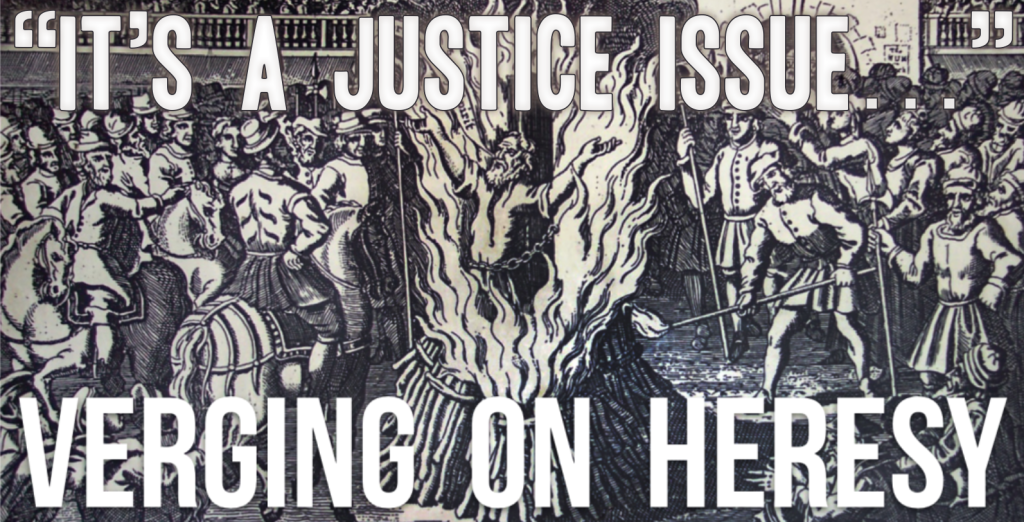Thank you everyone who’s encouraged me about my last post kicking off this ‘Verging on Heresy’ segment on the blog. It’s been cool, and I’m excited to crack on with it now.
Today, my first worry about the way we sometimes think and speak has to do with this phrase: “It’s a justice issue.”

Surely justice is good?!
The phrase can be worded in different ways: “Surely it just wouldn’t be fair if…”, “It just seems wrong”, “I couldn’t be part of a faith that…”. At heart, they’re all saying the same thing. It (whatever ‘it’ might be!) is clear and obvious and can be determined purely by seeing what is just and what is not. It’s a justice issue.
Ok, so surely justice is a good thing, right? Right! The God I read about on the pages of the Old and New Testament is the just God who wants this world to be governed by justice, by what is right. He combats injustice. He promotes justice.
So when people are discussing their opinion (normally on some issue of ethics) why do I struggle with people saying “Well for me this is a justice issue…” and then outlining what they think? Before getting to that, I want to go back a step or two to explore what we are really saying when we use a phrase like this.
What we’re really saying
This is going to be hard to talk about in the abstract. So let’s pick an issue. Let’s pick women in leadership. Should churches allow women to occupy positions of leadership at the highest level? My answer is unequivocally ‘yes’! But my reason for that is not that it’s a ‘matter of justice’, that it is obviously unjust for us to restrict people in that way, and since God is just we need to let women lead.
If that were my reason, this is what I’d be saying: I’m willing to sidestep all the complex issues, questions and arguments that surround this discussion (including and especially a discussion of what the Bible says on the matter). I’d be saying that I have an inbuilt sense of justice, and the idea that women shouldn’t be allowed to have a certain role offends that sense of justice. I know best.
The problem, which I hope is obvious, is that sometimes I do not know best. Sometimes I’m wrong. And I don’t want to be mean, but sometimes so are you.
One thing which is unquestionably clear in the Bible is that I’m broken. The ways I live is broken and the ways I think and feel are broken. I can’t trust my own gut reaction to an issue. Importantly, I can’t trust my sense of justice. I am sometimes unjust.
What if I were convinced it is perfectly just to commit fraud? Actually genuinely convinced, not just pretending. What I’d need is others to help me realise I am wrong. I’d need God to tell me I’m wrong. And I’d need to decide—against what feels like my ‘better’ judgment—to trust that God is right and I am wrong. And then stop committing fraud.
When we bypass discussion and debate around an issue, we’re refusing to accept we could be wrong, and we are refusing God the opportunity to set us straight. It’s actually rather arrogant.
I need to be brought—gently and kindly, but firmly—in line with God’s justice, and I need that most in the areas where that most offends my own (wrong) sense of justice. And to do that, we need to be willing to dive into the depths of these issues, to explore them and grapple with them. To expose ourselves to the arguments of scripture, and to choose to let what God reveals through the Bible to be the benchmark against which we’ll choose to believe and behave, not our own in-built sense of justice.
It might well be a justice issue, but whose justice? Are you willing for it not to be your own?
The exciting thing
This isn’t the end of it though. Having done that grappling, having exposed ourselves to all of that, we find ourselves in a place where we have a stronger sense of God’s heart for justice. Of what is right and wrong. True and false. Healthy and unhealthy. It might be a challenge to our thinking, but it will always be better than our thinking.
I do believe the issue of women in leadership is a justice issue. But I believe that because I’m convinced the Bible reveals that God does not limit either gender in leadership. And if God does not, then I will not. But that’s a lot different from ‘It seems wrong to me’.
So the exciting thing for me is that, once we have uncovered something of God’s heart for an issue or situation, we have far more power and impetus to fight for that than if it’s just our ideas and our opinions. I want that power because I can’t make a difference by myself.
Wanting justice needs to make us passionate in our pursuit of it, not lazy in our thinking about it.
-
Graham Criddle
-
http://limpingintotruth.blogspot.co.uk/ Dave Criddle
-
http://limpingintotruth.blogspot.co.uk/ Dave Criddle
-
Graham Criddle
-
-
Graham Criddle
-
-
